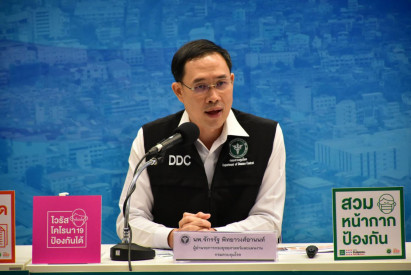
The Department of Disease Control is on alert for more monkeypox cases, especially among the LGBTQ community, saying the best way to prevent the disease is by reducing all close skin contact and not switching partners frequently.
Jakkarat Pittayawong-anont, director of the Department of Disease Control’s epidemiology division, said the number of patients infected with the virus seems to be stable, with only a few cases per month reported.
However he suspects there are many more unreported infections.
“Since the first case was discovered, we now have around 40 cases nationwide. Interestingly, we have seen more patients among the [homosexual] and LGBTQ group. So we would like to ask for more careful behaviour in terms of their sexual relations to help prevent the disease from spreading further,” he said.
Thailand in July of last year recorded its first case of monkeypox, diagnosed in a 27-year-old Nigerian man who travelled from his home country to Phuket.
He was admitted to hospital with a fever, cough, sore throat and runny nose. He also had rashes and lesions originating in his genital area, which had spread to other parts of his body.
The Ministry of Public Health later put out a warning about the disease and sought cooperation from hospitals and sex clinics, asking them to report any suspected cases to the ministry.
It also asked that all people arriving in the country be warned about the disease and to inform authorities if they had any of the symptoms.
Dr Jakkarat said close skin-to-skin contact is a prime cause of monkeypox infections so the best way to prevent the disease is by minimising this. Monkeypox is not an STD so wearing a condom will not prevent infection, he added.
Regarding vaccinations, he said jabs are not necessary at present because the rate of infection is so slow. Moreover, it is not a deadly virus and all of the symptoms can be treated.
The World Health Organization (WHO) said recently that monkeypox is no longer a global public health emergency, but all countries should remain vigilant.
WHO reported over 87,000 cases and 140 deaths found in 111 countries last year.

